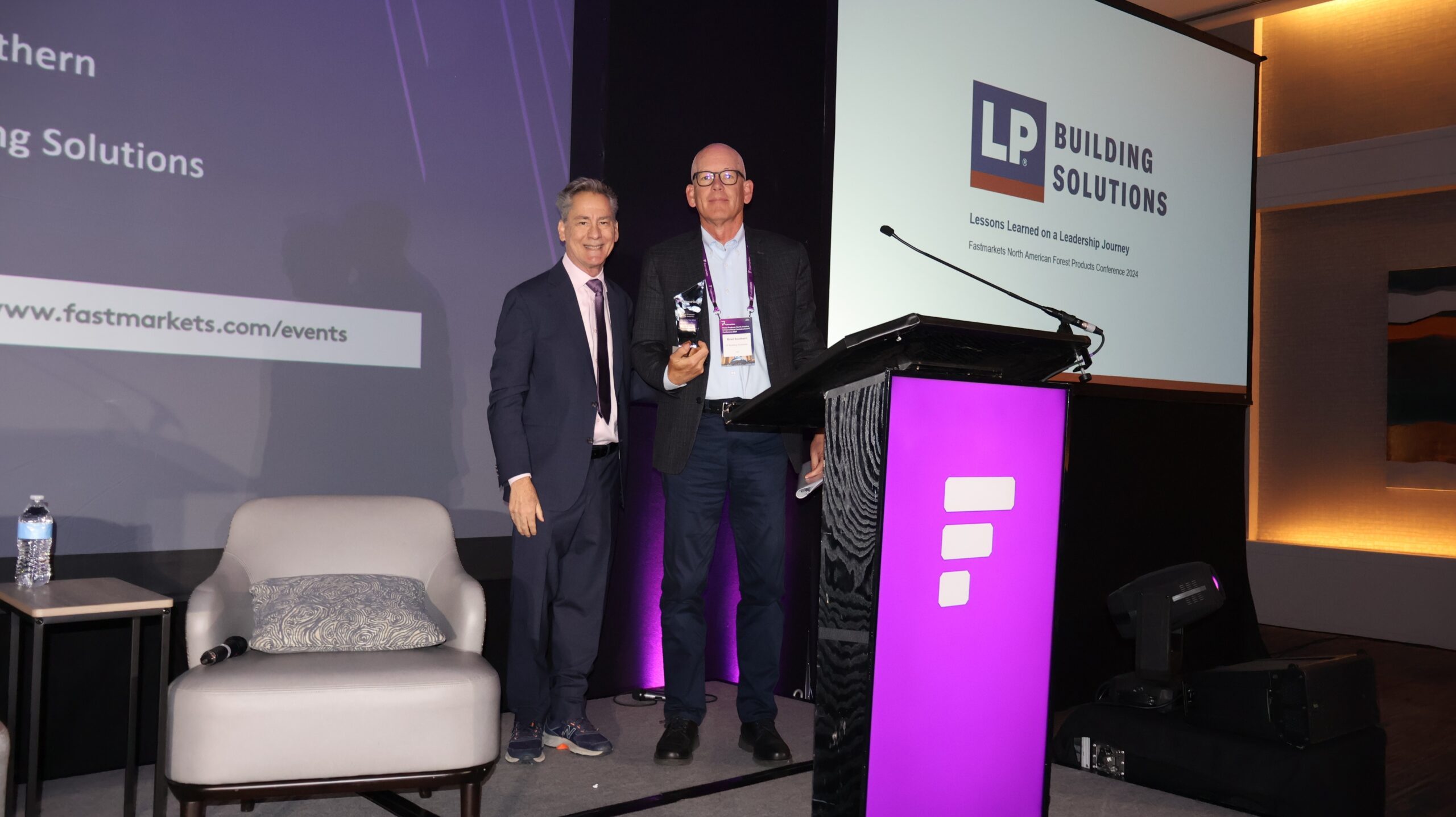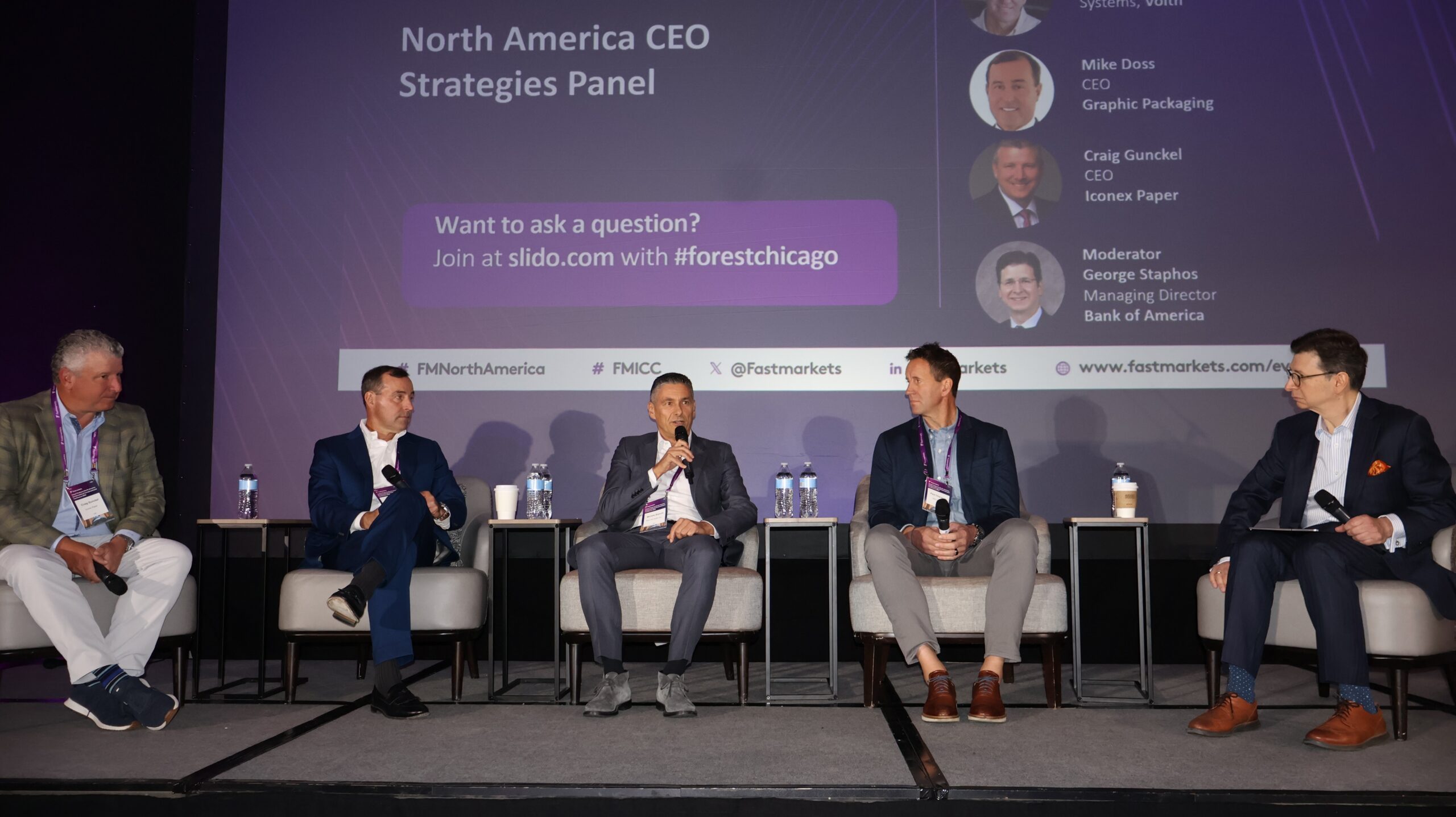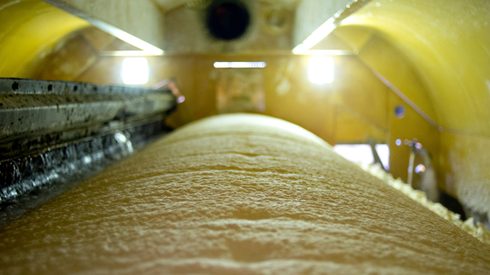Four packaging companies’ leaders participated in a CEO discussion panel at Fastmarkets’ Forest Products North America Conference & International Containerboard Conference in Chicago, IL, on Oct. 29.
The four leaders shared their views on how to grow business amidst volatile and uncertain markets, highlighting the importance of focusing on “sustainability” and “flexibility” to faster adjust to changes and maintain customers. They also talked about changing consumer preferences and artificial intelligence (AI) growth.
The discussion panel was moderated by StepChange Consulting CEO Joachim Klein and joined by Domtar pres for Paper & Packaging Steve Henry, Cascades Containerboard Packaging pres/COO Charles Malo, Mondi CEO for Corrugated Packaging Markus Gärtner, and CartoMicro CEO Luis Gonzalez Padilla.

The CEO panel participants cited some lessons they learned from the COVID pandemic and other market disruptions in recent years. Gärtner mentioned the need to “empower people” within companies, while Henry cited “supply chain resilience” and “working with suppliers and partners to navigate all the uncertainties” as the main takeaways from the pandemic.
Malo noted that “change is the only constant that is going to happen.” That said, he thinks it is important to “maintain agility in the corporations … and to have ways to more forward looking and keeping services” to customers. Padilla addressed the increasing importance of “nearshoring … bringing suppliers closer.”
The CEOs also discussed government regulations in the packaging markets and its impact on pulp and paper companies’ businesses. “Regulation constrains trade flows … The objective of regulation is very noble: to reduce impact of deforestation. But the European Union wants to control imports of forest products, which is very complex,” Gärtner said.
Other topics discussed in the CEO panel included sustainability and plastic substitution.
“We’re not investing enough money and time to make sure we have one story to tell as a sustainable industry,” Malo cited.
“We’re doing a lot, but we need to do more. We have a true story to tell,” Henry added.
“We have to offer a pathway from plastic packaging to paper packaging … We need to design our packaging to meet customers’ requirements,” Gärtner noted.
When talking about automation and AI, the four CEOs noted that it is more likely to be an “evolution” than a “revolution.” They mentioned that their companies are rapidly increasing the use of AI in several parts of their businesses, including R&D, commercial/sales, pricing, supply chain/manufacturing, procurement, and corporate functions.
Value creation
North American CEO of the Year Award winner Brad Southern, Louisiana Pacific (LP) Building Solutions CEO, spoke at the conference and highlighted five leadership lessons he learned along the seven years of being CEO of the company. According to Southern, those lessons include “understand value creation,” “build a top team,” “make courageous decisions,” “communicate well and often,” and “seek counsel everywhere.”

“You have to make the right move … to take very difficult decisions that turn out to be the best ones,” Southern said. He mentioned facing challenges and taking “aggressive actions” and ways to “create value to your company.”
Opportunities
Fastmarkets EVP of Analytic Dan Klein cited that the pulp and paper industry has many opportunities to grow, especially related to carbon markets and plastic replacement.
He added, “Most market participants hate risk and volatility,” and there are several ways to avoid it and managing risks by hedging and doing future contracts.
Four other paper companies’ leaders that participated in a second CEO Panel at Fastmarkets’ Forest Products North America Conference & International Containerboard Conference on Oct. 30 shared their views on how they expect the industry to look like in two to three years. The panel was moderated by Bank of America Securities managing director George Staphos.

Graphic Packaging CEO Mike Doss cited that he expects to see “much more recyclable paper products” in the markets.
Iconex CEO Craig Gunckel thinks “this is going to be the decade of paper,” and that “we’ll see the biggest transition ever seen in society.” He noted, “Paper is back. Paper is sustainable. Paper industry continues to be ‘the industry’.”
M2S CEO Paul Charapata added, “We’ll see more youth coming to our business” in the next 2-3 years. Charapata mentioned that the “peak 65” that is expected to happen this year in the USA, which would be a record-breaking year for retirement in the country. “More than 3.5 million US people will be turning 65 and retiring this year,” Charapata commented.
Michele Bianchi, CEO of Reno De Medici, said that he expects the market to perform better in two years. “The price still dominates the choice of the consumer … We need to drive the consumer to buy our products.”
Interested in getting more insights like this first hand? You can now register to attend the Fastmarkets Forest Products Europe Conference 2025 in March.




